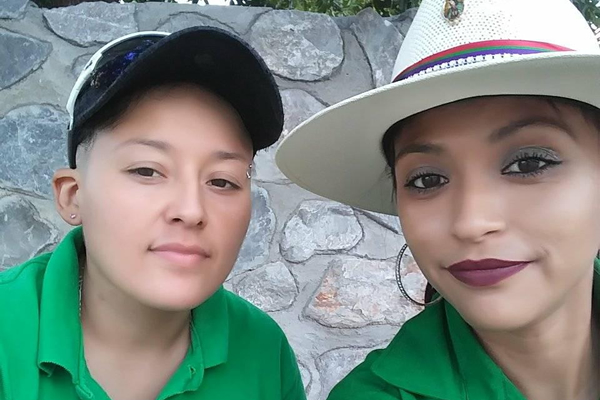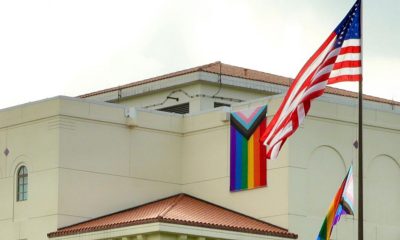World
Two arrested for lesbian couple’s murder, dismemberment in Mexico border city
Julissa Ramírez and Nohemí Medina Martínez killed earlier this month

Two people have been arrested in connection with the murder and dismemberment of a lesbian couple in the Mexican border city of Ciudad Juárez.
The Chihuahua Attorney General’s Office on Tuesday announced authorities arrested a 25-year-old woman and a 24-year-old man and charged them with aggravated femicide.
Authorities on Jan. 16 found the dismembered body parts of Julissa Ramírez and Nohemí Medina Martínez in plastic bags that had been placed along the Juárez-El Porvenir Highway. The Chihuahua Attorney General’s Office in a press release notes the suspects murdered Ramírez and Medina in a house in Ciudad Juárez’s San Isidro neighborhood on Jan. 15.
Ciudad Juárez, which is located in Mexico’s Chihuahua state, is across the Rio Grande from El Paso, Texas.
Members of Comité de la Diversidad Sexual de Chihuahua, a local LGBTQ rights group, and Chihuahua Gov. María Eugenia Campos Galván are among those who have expressed outrage over the women’s murders. Activists have also urged local and state authorities to investigate whether the murder was a hate crime based on Ramírez and Medina’s sexual orientation.
Local media reports said nine women — including Ramírez and Medina — were killed in Ciudad Juárez from Jan. 1-15.
Cameroon
Cameroonian LGBTQ activist shares journey of resilience, healing, and authenticity
Bandy Kiki recently married her Nigerian partner

Bandy Kiki, a Cameroonian LGBTQ activist and media personality who currently lives in the U.K., has married Jenny, her Nigerian partner.
Kiki, who came out as gay in 2017, said in a March 25 post that she had become “Ijaw by marriage.”
Ijaw is a tribe in Nigeria from where Jenny originates.
“For many people, celebrating love is expected, even assumed. But for those of us in the LGBTQ+ community, it is often questioned, as though our love needs justification,” Kiki told the Washington Blade in an exclusive interview.
And hers has been a journey of resilience, healing, and authenticity.
In this exclusive interview, Kiki shares her story as a gay person growing up in a Cameroonian society that considered, and still considers gay relationships as fundamentally flawed, and patently sinful.
“Facing societal perceptions and expectations required both resilience and self-discovery,” she said.
“In the beginning, it felt like I was constantly being asked to justify my identity, my relationship, and even my joy. There were moments of doubt, isolation, and deep frustration,” Kiki told the Blade.
“Over time, I have grown more confident in who I am. I have found community, chosen family, and a sense of self that no longer depends on anyone else’s approval.”
Here are some excerpts of the conversation.
BLADE: What inspired you to take this step and celebrate your love openly, despite the prevalent social and cultural stigmas about gays in your country of origin, Cameroon?
KIKI: When I was asked why I chose to celebrate my love openly, I couldn’t help but wonder: Would I be asked that if I weren’t queer? For many people, celebrating love is expected, even assumed. But for those of us in the LGBTQ+ community, it is often questioned, as though our love needs justification.
Coming from a culture where being LGBTQ+ is still heavily stigmatized, I spent a long time feeling like I had to hide or shrink parts of myself just to be accepted. That is why marrying my partner is not just about legal rights. It is about joy, truth, and visibility. It is about showing that our love is just as real, just as deserving, and just as worth celebrating as anyone else’s. It is about healing and choosing courage over fear.
BLADE: What does this marriage mean to you personally and culturally?
KIKI: Marriage is a fundamental human right for everyone of marriageable age, regardless of their sexuality. It is not just a legal bond but the quiet vow to grow old with someone, not by the accident of time but by choice, every day. Culturally, I see marriage as the coming together of families or the beginning of one.
BLADE: How did your love story with your partner begin?
KIKI: Our love story began in the most modern way. We met online. I was not expecting much, but from our very first conversation, something just felt easy. She quickly picked up on one thing about me. I talk about food a lot. I mean, a lot. Especially about how much I had been craving Waakye, one of my favorite Ghanaian meals.
Immediately after our first date at a restaurant, which went incredibly well, she asked me to come to her house for a surprise. Naturally, my mind wandered to certain possibilities. But when I got there, she brought out a big bag filled with takeaway bowls of Waakye she had ordered, just because I had mentioned it in passing.
In that moment, I knew this was something special. This was not just about food. It was about being heard. It was about someone who listened to what I said and cared enough to remember it. That simple gesture told me everything. She paid attention. She took action. She showed love not just in words but in thoughtful details.
That was the moment she had my full attention. And honestly, she has had it ever since.
BLADE: Describe your life at home?
KIKI: We are both women, and our marriage does not operate on traditional gender roles. There is no “husband” or “wife” in lesbian relationships, regardless of how either partner presents herself in terms of fashion or style. In our marriage, we are equal partners who show up for each other in the ways that feel right for us. I love food and I am the better cook, so I do the cooking. My wife handles the cleaning, which works perfectly because I genuinely dislike it.
BLADE: At what point in your life did it occur to you that you were more inclined to same-sex relationships, and given Cameroon’s aversion to homosexuality, how did you manage to date fellow women in those early days, and can you speak to some of the experiences you had?
KIKI: In my teens, when friends were thinking about boys, I was thinking about girls. When I finally had the courage to seek love, it was all about “understanding and response.” I would do nice things for them, hoping they would see me as more than just a friend and maybe even feel the same way about me. That way, there was always deniability if they wanted to out me. It cost me a lot in time, energy, and emotion, but in an environment like Cameroon, queer people develop different tools to cope. For the safety of those back home, I will not go into more or other details.
BLADE: How has your journey been in navigating societal perceptions and expectations?
KIKI: Honestly, it was incredibly challenging, especially right after I came out. But it has also been completely worth it. Staying in the closet might have been easier, but it would have cost me my mental health and the chance to live my truth.
Facing societal perceptions and expectations required both resilience and self-discovery. In the beginning, it felt like I was constantly being asked to justify my identity, my relationship, and even my joy. There were moments of doubt, isolation, and deep frustration.
Over time, I have grown more confident in who I am. I have found community, chosen family, and a sense of self that no longer depends on anyone else’s approval. I now accept that not everyone will understand my path, and that is okay. What matters most is that I do.
BLADE: How do you hope your story will impact others in similar situations?
KIKI: I hope my story offers comfort to those who feel alone or unseen. I want others in similar situations to know that their feelings are valid and that they are not the only ones navigating this journey. Even in difficult environments, there is strength in quiet resilience and there is hope in knowing that being true to yourself, even in small ways, is powerful. If someone can see themselves in my story and feel a little more understood, then sharing it will have been worth it.
BLADE: What advice would you give to individuals who may be struggling with acceptance or self-expression?
KIKI: Take your time. Your safety and well-being matter just as much as your truth. Self-acceptance is not a race. It is a process, and it is okay to go at your own pace. Seek out safe spaces, even if they are few and far between, and surround yourself with people who see and respect you. When you are ready, express yourself in ways that feel right for you, no matter how small. There is no one way to be you, and there is no shame in surviving.
Killian Ngala is a freelance journalist in Yaoundé, Cameroon.
South Africa
US-funded South African LGBTQ groups curtail operations
Suspension of most American foreign aid jeopardizes HIV prevention efforts

Two South African prominent LGBTQ organizations have become the latest victims President Donald Trump’s executive order that froze most U.S. foreign aid that the U.S. Agency for International Development disbursed.
Prior to the executive order, USAID had been playing a pivotal role in enhancing the rights of the LGBTQ community in South Africa through financial incentives. Since the executive order, many LGBTQ organizations have been struggling to remain afloat and provide services.
OUT LGBT Well-being on March 31 announced the closure of its Engage Men’s Health program.
The program offered stigma-free HIV and related health services through the President’s Emergency Plan for AIDS Relief, which USAID and the Centers for Disease Control and Prevention funded.
“For over a decade, OUT has been privileged to receive support through PEPFAR. In recent years, we proudly became the first local community organization to successfully graduate to direct recipient status of this funding from USAID. We are deeply grateful to the American people for their years of support,” sand OUT LGBT Well-being Executive Director Dawie Nel. “However, we regret the sudden and devastating impact of this funding withdrawal, not just on us, but on the thousands of individuals whose health and well-being depended on these services.”
Nel said Engage Men’s Health had managed to help 2,000 men who have sex with men stay on life-saving antiretroviral therapy, and provided 4,000 others with PrEP to prevent HIV infection.
“With these services now ending, we fear that HIV will spread more rapidly and that many will struggle to access the care they need,” added Nel. “While this marks the end of Engage Men’s Health, OUT LGBT Well-being will remain open. In the coming months, we will refocus our work and explore new ways to continue serving our community.”
Motlatsi Mkalala, board chair of Access Chapter 2, said USAID’s dismantlement has caused irreparable damage, which prompted the organization to close some of its branches and layoff some of its employees.
“As of the 1st of April 2025, operations across our various offices in the provinces of the Eastern Cape, Free State, Northwest, and Mpumalanga ceased,” said Mkalala. “The limited services at the headquarters in Pretoria will continue to run, but by a very small team.”
Emma Louise Powell, a South African MP and the Democratic Alliance party’s national spokesperson on international relations and co-operation, said PEPFAR since 2003 has played a transformative role in South Africa’s fight against HIV/AIDS, saving millions of lives and bolstering the country’s public health infrastructure. Powell said the cuts will prove disastrous.
“Given the critical nature of this life saving treatment, both government departments and non-profit organizations dependent on PEPFAR and related USAID funding across South Africa need more time to prepare for any potential phase-out of long-standing HIV/AIDS resourcing,” said Powell. “We call upon the secretary of state, Marco Rubio, and relevant policymakers to swiftly reinstate funding.”
Iranti spokesperson Mogau Makitla said Trump’s executive order is going to lead to the closure of many LGBTQ organizations. Makitla called upon the South African government to immediately step in and fill the funding void.
“South Africa has one of the highest rates of HIV/AIDS, whilst the government has made significant strides towards ending the pandemic, we anticipate that the closure of the aforementioned facilities will subsequently result in an increase in the spread of HIV/AIDS due to the decrease in management and mitigation services,” said Makitla. “Gender-affirming healthcare services, which have always been limited are also under threat as a result of the halt.”
Australia
Lesbian tennis player from Russia defects to Australia
Daria Kasatkina has publicly criticized war in Ukraine

A Russian tennis player who came out as a lesbian and publicly criticized her home country’s war against Ukraine has defected to Australia.
“My application for permanent residency has been accepted by the Australian government,” said Daria Kasatkina in an Instagram post on March 28. “Australia is a place I love, is incredibly welcoming and a place where I feel totally at home. I love being in Melbourne and look forward to making my home there. As part of this, I am proud to announce that I will be representing my new homeland, Australia, in my professional tennis career from this point on onwards.”
The Telegraph reported Kasatkina in 2023 said she left Russia because she did not feel safe “as a gay person who opposes the war.” Kasatkina’s partner is Natalia Zabiiako, a Russian Olympic figure skater who was born in Estonia.
“Obviously, there are parts of this decision that have not been easy,” said Kasatkina in her Instagram post. “I want to express my thanks and gratitude to my family, coaches, and everyone who has supported me throughout my tennis journey to date.”
“I will always have respect and fond appreciation for my roots, but I am thrilled to start this new chapter in my career and my life under the Australian flag,” she added.
-

 The White House5 days ago
The White House5 days agoUSCIS announces it now only recognizes ‘two biological sexes’
-

 Opinions3 days ago
Opinions3 days agoBoston sanctuary designation must be backed by policy changes
-

 Australia4 days ago
Australia4 days agoLesbian tennis player from Russia defects to Australia
-

 District of Columbia5 days ago
District of Columbia5 days agoTaste of Pride serves community, cuisine ahead of WorldPride












